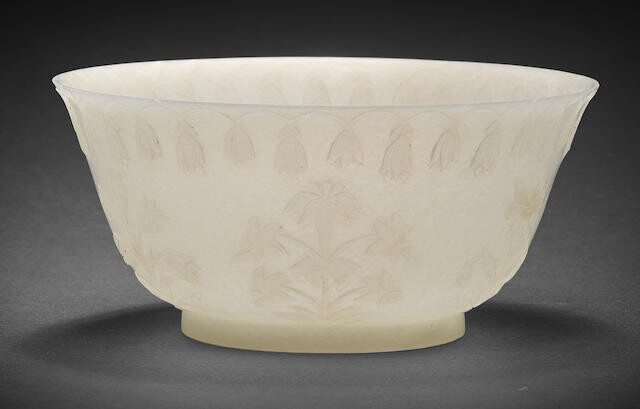A MUGHAL WHITE JADE BOWL
India, 18th century
India, 18th century
The translucent thin rounded sides flaring gently at the rim, finely carved with a meander of pendent flower buds at the rim above flowering leafy lily sprays encircling the body. 14.2cm (5 5/8in) diam.
十八世紀 痕都斯坦式白玉盌
Provenance:
Parry Collection, London, and thence by descent
來源:
倫敦Parry家族收藏,並由後人保存迄今
The delicate decoration of the present lot, in the form of floral motifs including a large bloom on a stalk set between two smaller blooms on stems, is inspired by the patterns and compositions frequently employed on other Islamic works of art and architecture.
The elegant vessel was probably produced in the northern Indian area centring around Agra, which, during the eighteenth century, was part of the Mughal Empire and famous for the production of refined jade vessels. Many such vessels were highly regarded by the Qianlong Emperor and entered the Imperial collections; they came into China through trade but were also presented to the Emperor as tribute and gifts from Qing Court officials.
For examples of compositions of floral motifs on Mughal jade works of art in the National Palace Museum, Taipei, see a bowl with poppies illustrated in Exquisite Beauty-Islamic Jades, Taipei, 2007, p.78, no.73; see also a spinach-green jade bowl decorated with lilies, ibid., p.71, no.62.
A related Mughal-style yellow jade bowl displaying a decoration scheme similar to the present lot was sold at Bonhams Hong Kong, 27 November 2014, lot 116.
白玉琢作大盌,外壁淺浮雕雕百合花束,口沿從每個弧線下凹處雕飾一朵花苞,且大小相間。這種大小相間的紋飾組合是伊斯蘭裝飾藝術中常見的圖案構圖。
本例或產自十八世紀的印度北部,當時屬於蒙兀兒帝國疆域。在蒙兀兒帝國治下,伊斯蘭玉器逐漸形成獨特的裝飾風格,痕都斯坦玉則為乾隆帝對伊斯蘭玉器的統稱。十八世紀後期,乾隆皇帝平定新疆後,痕玉被作為進貢給清廷的御用玉器,因其薄、透、輕巧,而深得乾隆皇帝厚愛。
台北國立故宮博物院館藏一例玉雕八角形盌,以及一例十八世紀花口花蕾形雙柄盌,外壁浮雕花卉紋飾皆與本例風格相仿,收錄於鄧淑蘋編著,《國色天香——伊斯蘭玉器》,台北,2007年,頁78,編號73,以及頁71,編號62。
另有一例痕都斯坦式黃玉雕蓮花紋盌,紋飾佈局可為比對,售於香港邦瀚斯,2014年11月27日,拍品編號116。
View it on
Sale price
Estimate
Time, Location
Auction House
India, 18th century
India, 18th century
The translucent thin rounded sides flaring gently at the rim, finely carved with a meander of pendent flower buds at the rim above flowering leafy lily sprays encircling the body. 14.2cm (5 5/8in) diam.
十八世紀 痕都斯坦式白玉盌
Provenance:
Parry Collection, London, and thence by descent
來源:
倫敦Parry家族收藏,並由後人保存迄今
The delicate decoration of the present lot, in the form of floral motifs including a large bloom on a stalk set between two smaller blooms on stems, is inspired by the patterns and compositions frequently employed on other Islamic works of art and architecture.
The elegant vessel was probably produced in the northern Indian area centring around Agra, which, during the eighteenth century, was part of the Mughal Empire and famous for the production of refined jade vessels. Many such vessels were highly regarded by the Qianlong Emperor and entered the Imperial collections; they came into China through trade but were also presented to the Emperor as tribute and gifts from Qing Court officials.
For examples of compositions of floral motifs on Mughal jade works of art in the National Palace Museum, Taipei, see a bowl with poppies illustrated in Exquisite Beauty-Islamic Jades, Taipei, 2007, p.78, no.73; see also a spinach-green jade bowl decorated with lilies, ibid., p.71, no.62.
A related Mughal-style yellow jade bowl displaying a decoration scheme similar to the present lot was sold at Bonhams Hong Kong, 27 November 2014, lot 116.
白玉琢作大盌,外壁淺浮雕雕百合花束,口沿從每個弧線下凹處雕飾一朵花苞,且大小相間。這種大小相間的紋飾組合是伊斯蘭裝飾藝術中常見的圖案構圖。
本例或產自十八世紀的印度北部,當時屬於蒙兀兒帝國疆域。在蒙兀兒帝國治下,伊斯蘭玉器逐漸形成獨特的裝飾風格,痕都斯坦玉則為乾隆帝對伊斯蘭玉器的統稱。十八世紀後期,乾隆皇帝平定新疆後,痕玉被作為進貢給清廷的御用玉器,因其薄、透、輕巧,而深得乾隆皇帝厚愛。
台北國立故宮博物院館藏一例玉雕八角形盌,以及一例十八世紀花口花蕾形雙柄盌,外壁浮雕花卉紋飾皆與本例風格相仿,收錄於鄧淑蘋編著,《國色天香——伊斯蘭玉器》,台北,2007年,頁78,編號73,以及頁71,編號62。
另有一例痕都斯坦式黃玉雕蓮花紋盌,紋飾佈局可為比對,售於香港邦瀚斯,2014年11月27日,拍品編號116。



